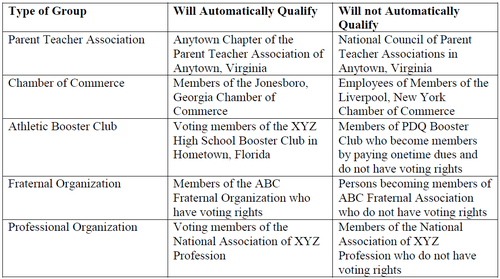NCUA Board Finalizes Changes to Associational Common Bond Rules
Written by Brandy Bruyere, Regulatory Compliance Counsel
On April 24, 2014, the NCUA Board proposed to amend requirements relating to associational common bonds. The proposal included the addition of a threshold determination where an association formed âÂÂfor the purpose of expanding credit union membershipâ would be rejected without further consideration. NCUA also proposed adding a factor to the current âÂÂtotality of the circumstancesâ test that would consider, based on several factors, whether âÂÂcorporate separatenessâ exists between the federal credit union (FCU) and the association. The proposal also listed seven kinds of associations that would be eligible for âÂÂautomaticâ approval. (NAFCU blogged about the proposal here and here).
Yesterday, the NCUA Board held an open meeting to consider several agenda items, including finalizing new rules relating to associational common bonds. Here is an overview of the changes.
Threshold Requirement
When reviewing an application to add an association to a FCUâÂÂs field of membership (FOM), NCUA will now make a âÂÂthresholdâ determination before even applying the totality of the circumstances test to âÂÂdetermine if the association has been formed primarily for the purpose of expandingâ FCU membership. (Preamble, p. 13). If so, NCUA will deny the addition, but if not, NCUA will then apply the totality of the circumstances test to determine if there is a common bond among the members of the association. While the proposal included a requirement that an association operated independently for at least one year prior to being added a FCUâÂÂs FOM, NCUA removed this in the final version.
Revised Totality of the Circumstances Test
The current test uses seven factors for determining whether there is a common bond among an associationâÂÂs members:
⢠ âÂÂWhether members pay dues;âÂÂ
⢠ âÂÂWhether members participate in the furtherance of the goals of the association (changed in the final rule);âÂÂ
⢠ âÂÂWhether the members have voting rights. To meet this requirement, members need not vote directly for an officer, but may vote for a delegate who in turn represents the members' interests;âÂÂ
⢠ âÂÂWhether the association maintains a membership list;âÂÂ
⢠ âÂÂWhether the association sponsors other activities;âÂÂ
⢠ âÂÂThe association's membership eligibility requirements (changed in the final rule);â and
⢠ âÂÂThe frequency of meetings.âÂÂ
Neither the presence nor the absence of any of these factors will determine whether an association has a common bond, rather all the factors are viewed in their totality. In other words, operationally the rule remains the same. However, the final rule adds an additional factor to this test relating to separateness between the credit union and the association, and changes the language of a couple of the existing factors:
- âÂÂWhether the association provides opportunities for members to participate in the furtherance of the goals of the association;â Â
- âÂÂWhether the association's membership eligibility requirements are authoritative;âÂÂ
- âÂÂSeparatenessâ NCUA reviews if there is corporate separateness between the group and the federal credit union. The group and the federal credit union must operate in a way that demonstrates the separate corporate existence of each entity. Specifically, this means the federal credit unionâÂÂs and the groupâÂÂs respective business transactions, accounts, and corporate records are not intermingled.âÂÂ
While the proposal would have considered several specific factors as to whether the association and the credit union maintain separateness, the final rule uses more general factors. For example, whether the association and the credit union maintain a separate physical location is no longer one of the listed considerations for separateness.
Pre-approved Groups
The April 2014 proposal included seven groups that could be automatically added a FCUâÂÂs charter:
- Alumni associations;
- Religious organizations (including churches or groups of related churches);
- Electric cooperatives;
- Homeowners associations;
- Labor unions;
- Scouting groups; and
- Associations that have a mission based on preserving or furthering the culture of a particular national or ethnic origin.
The final rule includes these seven kinds of groups and five additional groups eligible for automatic approval:
- Parent teacher associations that are âÂÂlocalâ and âÂÂserve a single school district;
- Chamber of commerce groups, limited to the groupâÂÂs members (not the membersâ employees);
- Athletic booster clubs whose members have voting rights;
- Fraternal organizations or civic groups âÂÂwith a mission of community serviceâ where members have voting rights; and
- Organizations promoting social interaction or educational initiatives among people with âÂÂa common occupational profession.âÂÂ
Here is a chart of examples from the preamble to the rule:
NCUA also added language stating that âÂÂeach class of member will be evaluated based on the totality of the circumstances. Individuals or honorary members who only make donations to the association are not eligible to join the credit union.â See, Final Rule, p. 34. However, NCUAâÂÂs other requirements for adding groups to a FCUâÂÂs charter relating to the FCUâÂÂs capitalization, safety and soundness record, harm of an expansion on existing members, etc. will still apply. See, Preamble, p. 12; Chartering and Field of Membership Manual, IV.B.2âÂÂNumerical Limitation of Select Groups.
The rule will go into effect 60 days after publication in the Federal Register. At yesterdayâÂÂs Board meeting, NCUA staff advised that the agency is drafting guidance to delineate how the Office of Consumer Protection (OCP) will apply the revised totality of the circumstances test as well as clarify the due process procedures OCP utilizes when evaluating an expansion application. As you review the final rule, if you encounter any areas you believe warrant clarification in this upcoming guidance, please reach out to NAFCUâÂÂs Director of Regulatory Affairs, Alicia Nealon, anealon@nafcu.org.Â
***
Palate Cleanser. Being from Northeast Ohio, it was against my better judgment but I bought my son a Red Sox shirt to make my Bostonian husband happy. Lemmy photo bombed Nolan, then just had to say hi!



